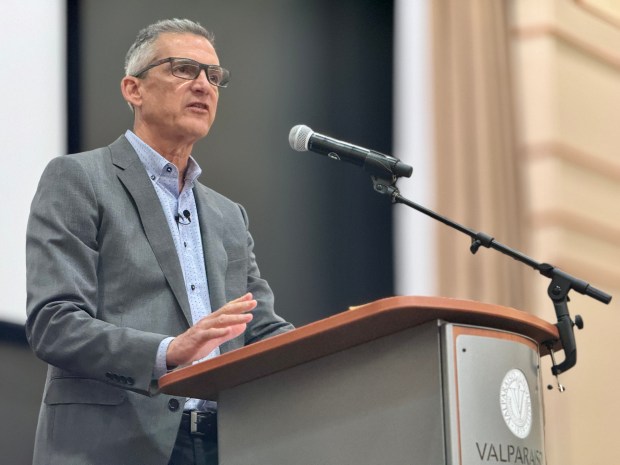Highland Park’s ongoing dispute over a 90-year-old ordinance prohibiting City Council members from holding liquor licenses came to an end Monday evening, but bitter comments from council members and residents related to the controversy left a rift in the community.
Last year, Councilman Jeff Hoobler resigned from his seat after a Prohibition-era city ordinance was rediscovered barring local officials from holding liquor licenses. Hoobler, owner of Steep Ravine Brewing Company, formerly Ravinia Brewing, chose to step down rather than give up the license.
It was the spark for a lengthy and heated controversy that spilled into public events and consumed hours of council meetings. In November, a referendum calling for an amendment to the liquor license ordinance passed with overwhelming public support, but a council vote on the issue was put off until this year despite calls from some residents and council members Annette Lidawer and Andres Tapia to resolve the issue sooner.
While Monday evening’s amendment passed unanimously, Lidawer, Tapia and several residents questioned the timing of the change. The deadlines for the April municipal election have passed, and all but one City Council incumbent will be running unopposed.
Mayor Nancy Rotering pushed back against accusations questioning the timing of the liquor-license vote, arguing the council had acted quickly within reason. After the referendum passed in November, Rotering said she had “noted we would discuss this issue in 2025.”
“This is the third meeting in 2025, and the first opportunity for a thorough discussion where all voices can be heard,” she said. “Deliberation and due diligence are not political tactics. They’re the foundation of responsible governance.”
Rotering and several other board members argued there had been several key questions that remained unanswered about the original goal of the ordinance, and the potential consequences of its amendment. Rather than rush ahead, the mayor said their responsibility was, “to uphold the integrity of our government while ensuring that policies remain fair, practical and reflective of our values.
“Governance should not be about personal gain or political maneuvering,” she said. “It should be about fairness, transparency and credibility to the residents we serve.”
Several council members, including Rotering, said they had been uncomfortable with changing the ordinance before Hoobler resigned due to the potential for the “appearance of impropriety,” she said.
Anthony Blumberg said he had previously been against amending the ordinance because, “we were essentially being asked to change the law to accommodate an individual who found himself in violation of the law.”
However, Blumberg said he had “always indicated” a willingness to change his position, “under the normal circumstances in which we normally legislate.”
Rotering discussed several of the questions she has about the amendment, regarding recusal and issues of conflict of interest. According to the city’s legal counsel, having a liquor license is largely in line with council members that are in other professions, such as real estate, and will be covered by Highland Parks’ existing recusal rules and recently strengthened ethics ordinances.
Tapia and Lidawer, the only two candidates in support of putting an amendment on the city agenda last year, were both highly critical of the vote’s timing, going so far as to question the motivations of their fellow council members.
Tapia argued the controversy had “damaged” the city’s name and credibility, and the issue should have been dealt with sooner without “dragging” the community through the controversy. He said he was “glad” to put it behind them.
“It’s taken more than a year, and that is unacceptable,” Tapia said. “We have made very big decisions about very big things in the city with less time taken. I really question the timing, especially when it was an urgent matter.”
Lidawer said the issue had been thoroughly studied and researched months ago, but the council failed to bring a vote forward. She felt the process was needlessly extended for political reasons. The date for residents to register as a write-in candidate passed in late January. On Monday, the amendment appeared “on the council agenda with clarifications as to ethics regulations discussed and accepted in September 2024.”
“Where were all the other questions and the need for additional study that we were advised of in November that over a nine-month period we couldn’t have answered?” Lidawer said. “I don’t believe in coincidences. The fact is that several members of this body protected their own seats over the will of the community.”
She thanked community members for their efforts to push the amendment. The city had received hundreds of emails voicing support, she said.
“In spite of the delays, this change has been affected because of you, and democracy, while it might be slow, will eventually be served,” Lidawer said.
Blumberg said he had been well aware of the public support for the amendment.
“But, as I’ve stated consistently, the fact an opinion is held by a majority of residents is something that I may consider, I do not consider it to be controlling,” he said. “We’ve been asked to vote according to the will of the people, and I’m uncomfortable with that. I’m here to represent the community, not an individual … and not any specific group.”
The most bitter comments were made by former council member Hoobler who, because of the timing of the amendment, was not permitted to be added to the ballot to run for the remaining two years of his vacated term.
City Council veteran Kim Stone has chosen to run for his former seat, which is currently held by Barisa Bruckman, who is running unopposed for a full four-year seat. Stone faces political newcomers Jon Center and Kevin Cullather.
“This wasn’t just a coincidence,” Hoobler said. “It was a calculated move to manipulate the democratic process.”
Hoobler also questioned the withdrawal of The Art Center Highland Park Executive Director James Lynch from the election campaign in December. Lynch was the only non-incumbent running for a full-term seat.
“People are systematically preventing qualified candidates from running, while long-term incumbents remain in power for years, many times not even opposed,” Hoobler said.
Lynch, for his part, said he was approached by The Art Center board members who were concerned the council position would make him less effective as a director and be a conflict of interest.
He withdrew because he agreed with their assessment, Lynch said. The Art Center shouldn’t be involved with politics, he said, and with the challenges facing many nonprofits today, he was “happy” with his decision to focus on the center.
“I’ve got my hands full,” Lynch said.
During public comments, several residents called for unity after the division wrought by the liquor-license controversy.
“People have said things online that they can never take back to their neighbors,” Ashbey Beasley said. “This has caused such a divide and such a rift in our community, which is very sad. I would really like to ask you to make an effort to bring our community together again.”




